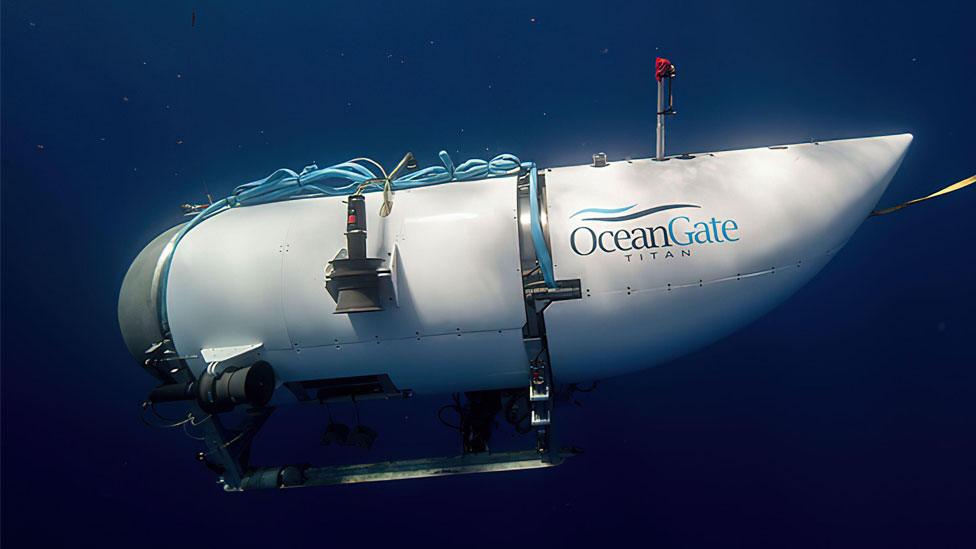Titanic sub: OceanGate co-founder fears there was an 'instantaneous implosion'
- Published
OceanGate co-founder: 'Rush one of the most intelligent people'
A co-founder of OceanGate - the company which runs the Titan submersible tours to the Titanic - says he fears there may have been an "instantaneous implosion" of the sub.
Guillermo Söhnlein said there was a possibility there had been a catastrophe.
He was being interviewed as news of the emergence of debris in the Atlantic came in.
A friend of passengers aboard the Titan said the debris found was from the sub.
A Coast Guard news conference is scheduled for Thursday afternoon.
Speaking about his fears of an implosion, Mr Söhnlein told the BBC: "What I do know is regardless of the sub, when you're operating at depth the pressure is so great on any sub that if there is a failure it would be an instantaneous implosion. If that's what happened that's what would have happened four days ago."
Mr Söhnlein founded OceanGate in 2009 along with current CEO and pilot of the sub, Stockton Rush, who is among the missing.
Also onboard the 22-foot vessel is British businessman Hamish Harding, British-Pakistani businessman Shahzada Dawood and his son Suleman, and former French navy diver Paul-Henry Nargeolet.
He said he would not be surprised if there was something on the surface.
"I know that our protocol for lost comms is for the pilot to surface the sub. From the beginning I always thought that's probably what Stockton would have done.
"In which case it becomes very difficult to find the sub because the surface ship wouldn't have known it was coming up and wouldn't have known where to look.
"My biggest fear through this whole thing watching the operations unfold is that they're floating around on the surface and they're just very difficult to find."
Mr Söhnlein, who left OceanGate 10 years ago, said he would not have acted differently in the circumstances.
He said: "If anything, I think we need to go back and learn from what's happening, find out what's happened, take those lessons and carry them forward."
In a statement issued on Thursday after, the US Coast Guard said the debris field was discovered by a remote-controlled underwater search vehicle (ROV) near the wreck of the Titanic.
Experts are now evaluating the information to determine whether it is linked to the submersible.
But dive expert David Mearns, who is a friend of passengers aboard the Titan, said the debris found was from the submersible and included a landing frame and a rear cover.
The US Coast Guard will provide an update at a press conference at 15:00 local time (20:00 BST).
Watch: What debris has been found and what does it mean?
Questioned by the BBC why the Titan sub had not been made subject to official regulations, Mr Söhnlein said that the "human submersible community globally is very small" and that "developing innovations and any new technology, including submersibles, means that sometimes you have to go outside of the balance of the regulatory scheme".
He said that within the community "we all know each other and I think generally we all respect each other's opinions".
"But the bottom line is that everyone's got different opinions on how subs should be designed, how dives should be conducted, how expeditions should be conducted.
"The challenge, though, is with all of us having opinions is none of us have all the facts. So it's difficult to form these opinions."
OceanGate describes the sub as an experimental vessel and when a correspondent from the BBC's US partner, CBS, travelled on it a few years ago, he had to sign a waiver accepting that it "has not been approved or certified by any regulatory body, and could result in physical injury, disability, emotional trauma or death".
In a press release in 2019, the company explained why the Titan had not been classed by an independent body. "Bringing an outside entity up to speed on every innovation before it is put into real-world testing is anathema to rapid innovation," it said.
In a promotional video, OceanGate Expeditions software security expert Aaron Newman tells prospective clients that travelling on the sub is "not a ride at Disney, you know".
"There's a lot of real risk involved, and there's a lot of challenges," he says.
Related topics
- Published21 June 2023
